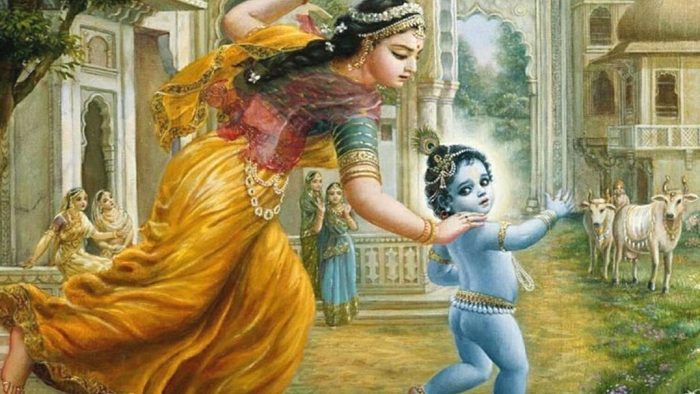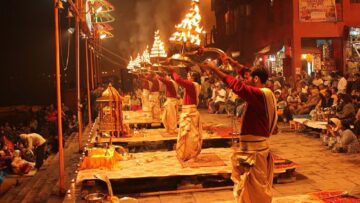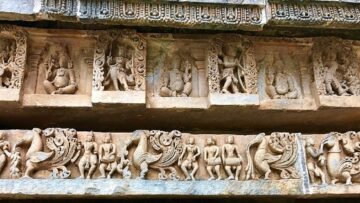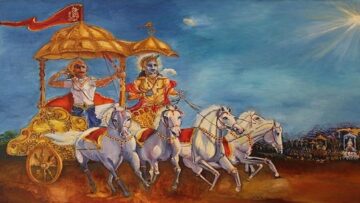The Avatāras are the manifested Forms of Īshvara in historical contexts. They are the physical forms that Īshvara takes in full vision of humanity. Among the innumerable Avatāras, Krishna Avatāra is considered the most important incarnation of Bhagavān Vishnu. In fact, some people hold that Krishna is the real form of Vishnu, and all other incarnations and even Vishnu itself are less important forms of Krishna.
In the Bhagavad Gita, Krishna says to Arjuna: “Whenever there is a decline of Dharma and a rise of Adharma, I manifest Myself (4.7)”. He further says: “For the protection and deliverance of the good, and destruction of the evil-doers; and for the sake of re-establishing Dharma, I am born in every age (4.8)”.
So, let us read some of the beautiful accounts from the life of Sri Krishna on this earth.
The Wedding of Krishna’s Parents and their Imprisonment
During the final phase of Dwapara Yuga, a marriage procession was taking place in the city of Mathura. The city was on the banks of the river of Mathura. Vasudeva had married Devakī, and their chariot was being driven by Kamsa, the cousin brother of Devakī. Suddenly, a loud voice spoke from the skies, “Cruel Kamsa, the eighth child of Devakī will kill you one day.”
Kamsa became terrified when he heard this heavenly announcement. He pulled Devakī from the chariot by her hair and said, “I will kill her. Then she will not have any kids, and no one will kill me.” But, her husband Vasudeva begged with Kamsa, “Please do not kill your own sister. I promise to you that we will hand over all of our children to you as soon as they are born. But please do not kill my wife.”
Kamsa agreed, but he put both Vasudeva, and Devakī, his own sister, into a jail where guards kept a watch on them. Not only that, Kamsa imprisoned his own father Ugrasena because he had opposed Kamsa for his evil ways. And then, Kamsa started troubling anyone who was a family member of Vasudeva.
 Kamsa killed the older siblings of Balarāma and Krishna: Every time a child was born to the couple, it was handed over to Kamsa. The heavenly voice had said that the eighth child of Vasudeva and Devakī will kill Kamsa. But, Kamsa was so scared of dying that he went ahead and killed the first six children born to them.
Kamsa killed the older siblings of Balarāma and Krishna: Every time a child was born to the couple, it was handed over to Kamsa. The heavenly voice had said that the eighth child of Vasudeva and Devakī will kill Kamsa. But, Kamsa was so scared of dying that he went ahead and killed the first six children born to them.
The birth of Balarāma
Just before Devakī was expecting the seventh child, Bhagavān Vishnu took the jivātma of the child and put it inside Rohinī, who was another wife of Vasudeva living in the village of Gokula. This village was across the river Yamuna and not very far from Mathura. Rohinī delivered the child after some time, and he was named Balarāma. Meanwhile, the seventh child born to Devakī was lifeless because it had no jivātma. The guards told Kamsa that the seventh child had died before it was born.
The birth of Krishna
Now, Devakī became pregnant for the 8th time. This time, her face started glowing, and there was light in the prison where they lived. Everyone now knew that a great soul had entered Devakī and that the new child will be the one who will kill Kamsa. This child was Krishna. When the child was born, a miracle happened. All the guards mysteriously went to sleep. The jail doors opened on their own.
Bhagavān Vishnu appeared to the couple and asked Vasudeva to take the child across the Yamuna River to the home of Nanda, where his wife Yashodā had also just delivered a baby girl. By a miracle, everyone in Gokula fell into a mysterious sleep as well.

Vasudeva put the child in a basket on his head and started walking across the river Yamuna. It was pouring heavily and the lighting made a loud thunder. But the river waters lowered themselves so that Vasudeva could walk across the river. A seven hooded snake appeared and covered the child with its hood throughout the journey, and thus preventing baby Krishna from getting drenched.
Vasudeva reached the home of Nanda, where he switched Krishna with the daughter of Nanda. As the mother Yashodā was tired and sleeping, she did not notice the switch. Vasudeva then walked back to the prison with the daughter. As soon as he entered the prison, the doors locked on their own, the guards woke up and they heard the crying of a baby girl. They immediately informed Kamsa, who rushed to the prison and laughed, “Was this girl going to kill me? Ha! Look, I will smash her head right now in front of you.”
As that cruel Kamsa snatched the girl from the terrified Vasudeva and Devakī, she slipped out of his hands and flew to the ceiling. A voice said, ‘You cruel man, the child who will kill you has already taken birth and is living somewhere else.” Then, the girl disappeared.
Krishna kills Pootanā
Meanwhile, everyone in Gokula woke up and saw the dark blue child Krishna in the arms of Yashodā. They were overjoyed and started celebrating. Kamsa did not give up his wickedness. He still kept Vasudeva and Devakī in the prison. Then, he ordered that every child who was less than one year old in his kingdom be killed. Many parents hid their children. So, Kamsa sent a demon Pootanā to find these children.
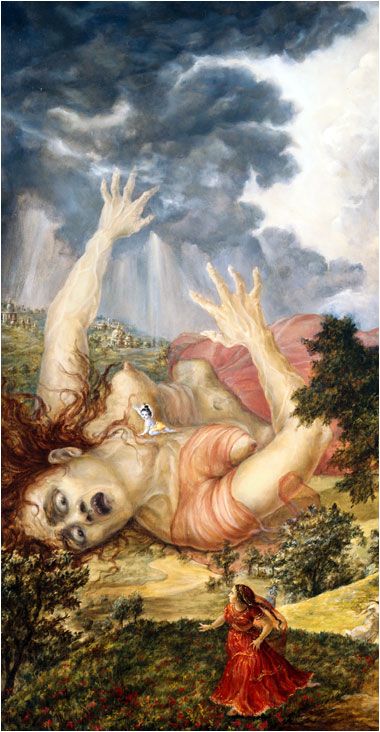 Pootanā disguised herself as a beautiful gopī – a lady who raised cows for milk, and reached Gokula. She had smeared her breasts with a poison and would start feeding any child that she saw. Many children died in Gokula due to her wicked deeds. When she saw Krishna, she picked him up and pretended to feed him milk.
Pootanā disguised herself as a beautiful gopī – a lady who raised cows for milk, and reached Gokula. She had smeared her breasts with a poison and would start feeding any child that she saw. Many children died in Gokula due to her wicked deeds. When she saw Krishna, she picked him up and pretended to feed him milk.
But her poison had no effect on the Divine child Krishna. Instead, Krishna sucked her life out of her, and she fell dead. As she died, her true form showed and the people were shocked to see that the beautiful Gopī was actually a giant lady demon!
Krishna, the Butter Thief
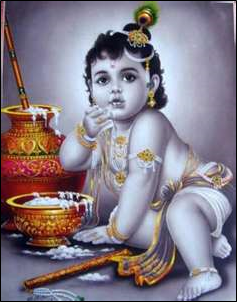 Krishna and Balarāma started growing up as very naughty children. Krishna loved to eat butter and drink buttermilk. He would steal them from the homes of the gopīs. He formed a group of other naughty kids, who would chase the gopīs carrying pots of buttermilk, and would break their pots. All the gopīs would get very angry at first.
Krishna and Balarāma started growing up as very naughty children. Krishna loved to eat butter and drink buttermilk. He would steal them from the homes of the gopīs. He formed a group of other naughty kids, who would chase the gopīs carrying pots of buttermilk, and would break their pots. All the gopīs would get very angry at first.
But Krishna was so cute a child that they would forget their anger in a minute, and would feed him more butter and buttermilk!
Yashodā sees the Universe inside Krishna’s Mouth
Krishna had just grown up to be a little boy, who could walk. So, he used to play with other children of his age outside his house. One day it so happened that Krishna, while playing, put some soil into his mouth, One of his playmates went up to Yashodā and told her about what Krishna had done.
Yashodā caught Krishna by the hand and brought him inside. She said, “My son! It is bad to put soil into the mouth. It leads to worms in the belly and soil-eating children often fall ill. Have you eaten soil? Open your mouth and show it to me.”
“No, mother; I haven’t eaten soil at all”, retorted Krishna. “But open your mouth and show me,” Yashodā said again. Krishna opened his mouth wide and Yashodā was wonder-struck to see the entire universe–the sun, the moon, stars, the earth, etc.—inside Krishna’s mouth.
Now, Yashodā was fully convinced that her son was not an ordinary boy, but God Himself. Seeing Yashodā overwhelmed and in a state of shock, Krishna made her forget the incident through his divine power. Yashodā again began to fondle him with deep affection
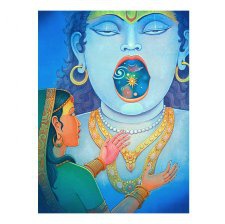
This story indicates how the entire Universe exists inside God/Brahman, as if He is the abode or the home inside which we all live. The story also illustrates how we would not be able to fathom the mysteries of the Universe, unless we are ready in body and mind and hence, it is important to first purify the body and mind to make it fit for perceiving ultimate reality.
Brahmā Realizes that Krishna is Bhagavān:
As the boys grew older, they were given the task of taking all the cattle to the nearby forest for grazing during the day. Krishna, Balarāma, and the other boys would take the cattle at sunrise to the forest, and then after a whole day of grazing them, they would bring them back at the sunset. In the forest, the boys would play games and Krishna would play his flute, while the cows grazed.
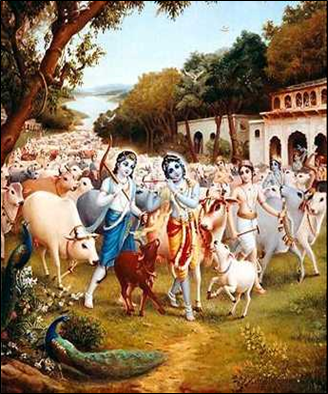
One day, some calves wandered deep into the jungle. The cowherds got scared that some wild animals might kill and eat them. To remove their fears, Krishna offered to go and search for them. When Krishna left the scene, Lord Brahmā thought of a plan to test the power of Lord Vishnu. He thought, “Lord Vishnu has taken the form of a child. Surely, as a child, God cannot display His great powers. Now let me see what wonderful miracles this child Krishna can show me!”
So, Brahmā immediately went to the banks of Yamuna, where the cowherds and the cows were waiting for Krishna. He put them to sleep through his powers, and immediately transported them to a cave. When Krishna returned with the wandered calves after finding them in the jungle, he saw that all his friends and cows were missing from the spot where he had left them! He immediately realized that Brahmā was the culprit. Instead of bringing Brahmā to the task, Krishna saw this as a chance to teach him a lesson.
So, Krishna immediately multiplied Himself and created all the cows and cowherds, who had been kidnapped by Brahmā. These creations of Krishna were identical in every respect to the kidnapped cows and cowherds. Then, as the sunset came, they all went back to their village where their mothers received them with a lot of love.
Almost a year came to pass. Krishna and the new cowherds and cows continued to come to the banks of the Yamuna to graze and drink as usual. Meanwhile, Brahmā had returned to his abode. When he returned back to the earth, he was stunned to find all the cowherds and cows with Krishna at the same spot where he had kidnapped them from. But, when Brahmā rushed to the cave, he found all of them sleeping peacefully, just as he had placed them there.
Brahmā now felt guilty for having tried to test the power of God. Krishna merged back the new cowherds and cows into himself. Krishna showed Brahmā that even while He was with the cowherds on the banks of Yamuna, he was also present in his village playing with other cowherds at the same time. Brahma realized that although he had tried to trick Bhagavān, he was the one who had got tricked! He approached Krishna and fell at his feet. He sang a hymn in praise of Bhagavān and said,
“O Lord, you appear as a little kid with a flute in your hand, causing people to think that you are a mere boy. You reveal your true form to your devotees who love you. But this devotion or love towards you is so difficult for those people whose minds are filled with ego. I thought that I am great because I created this Universe from an egg of matter. But you are so infinite my Lord that an infinite number of these eggs can come out of each pore of your body and create infinite Universes! You exist inside the entire Universe, and also outside it. You exist even when the Universe no longer exists! It is You Who creates all this with Maya and we all get fooled. The fact is that this Universe exists only because of You. Without your powers, it will not exist. Please grant me the gift that I may be devoted to you always.”
Krishna blessed him and Brahmā returned to his abode. All the cowherds and cows that had been put to sleep, woke up as if nothing had happened, and they spent the rest of the day as a picnic.
Krishna kills Kāliyā:
One day when they had all gone out with the cows, the children and the cows drank water from Yamuna and immediately fell dead. Krishna realized that a very poisonous snake called Kāliyā had come to inhabit that river. Its venom had made the river water poisonous. Krishna climbed on top of a tree and jumped into the river. He dived deep into the bed and caught hold of the snake. Initially, the snake entangled itself around Krishna.
 When the word spread that Krishna had jumped into the river and was being choked by the snake, everyone got scared, and they rushed to the river bank. But soon, Krishna expanded its body and made the snake tired with His tricks. Then, to everyone’s amazement, He did a wonderful dance on the hoods of Kāliyā. Krishna commanded the snake to leave the river, and move to an isolated island in the ocean, where no one lived.
When the word spread that Krishna had jumped into the river and was being choked by the snake, everyone got scared, and they rushed to the river bank. But soon, Krishna expanded its body and made the snake tired with His tricks. Then, to everyone’s amazement, He did a wonderful dance on the hoods of Kāliyā. Krishna commanded the snake to leave the river, and move to an isolated island in the ocean, where no one lived.
Krishna appears to a Fruitseller Lady
One day, Krishna was playing in his village. He saw a fruit-seller lady walk by. She was selling delicious fruits and Krishna loved eating fruits. His mother was not at home. Therefore, Krishna did not have any money to buy fruits.
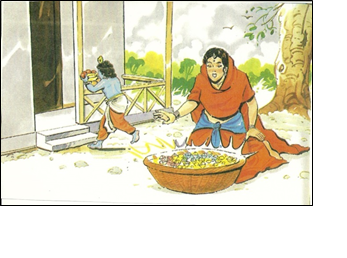
in his tiny palms and rushed to the fruit-seller. He said to her, “I love to eat the fruits, but I do not have money to pay you. I brought these grains instead of money. Can you take these grains and give me some fruits to eat?”
The fruit-seller looked at Krishna and smiled. She did not know that the little kid was Bhagavān. She thought that he was just any other kid. With kindness, she said, “Do not worry little boy. You do not have to pay me. You are very truthful and honest. Therefore, you can take as many fruits from my basket as your little hands can hold.”
Krishna was really happy to hear this. The fruit seller bent down and kept the basket on the ground. Then, Krishna picked several fruits and went back into His home happily.

When the fruit seller started picking up her basket, she felt that it was shining a lot. She looked into the basket and was surprised to see that all the fruits had become big diamonds and other gems! She now knew that Krishna was Bhagavān, who had come in disguise. She had been kind to Him, thinking that He was just a little kid. But, Bhagavān gave her a lot of riches because she was very kind, compassionate, and helpful to others.
We Hindus believe that Bhagavān can come to visit us in many different disguises. He can come as a poor man, or a dog, or a bird. We should be kind to everyone and should share our things with them and speak to them lovingly. You never know when your guest is actually Bhagavān Himself!
Krishna Lifts the Govardhana Mountain
When, Krishna’s popularity reached heaven, Indra, the King of heaven and the lord of the rains, became very jealous. When, at the behest of Krishna, people of Gokul stopped worshiping Indra and instead started worshiping Govardhana Mountain, Indra got angry and started pouring heavy rains over Gokul. There was a sudden flood and people panicked as they ran in all directions for shelter. Krishna performed a miracle – he lifted the Govardhana Mountain on his little finger as an umbrella and gave shelter to everyone under the mountain. When Indra saw this, he felt ashamed. He came down from the clouds to Gokula and asked Krishna for forgiveness.
Krishna multiplies during Rāsalīlā
After the rains ended, the autumn season sets in. The weather was beautiful. All the Gopīs fell in love with Krishna. On a full moon night, Krishna went to the banks of the river Yamuna in Vrindavana and started playing his flute melodiously. All the Gopīs left their homes, and they all started dancing together. Krishna multiplied himself, so that all the Gopīs thought that He was dancing with her alone.
 When the sun started rising the next day, Krishna sent them back to their home. Every night, the Gopīs came to dance, and this is called the Rāsalīlā. This incident has a very deep meaning. The Gopīs are common simple folks like us. But, their devotion was so pure that Krishna had to multiply himself and dance with each of them. The episode also shows how God takes care of each of his devotees personally.
When the sun started rising the next day, Krishna sent them back to their home. Every night, the Gopīs came to dance, and this is called the Rāsalīlā. This incident has a very deep meaning. The Gopīs are common simple folks like us. But, their devotion was so pure that Krishna had to multiply himself and dance with each of them. The episode also shows how God takes care of each of his devotees personally.
Krishna kills Kamsa
One day, Rishi Nārada reached Mathura and revealed to Kamsa that the eighth child of Devakī was none other than Krishna. Kamsa thought that it was the right time to kill Krishna. He arranged a wrestling match and invited Krishna and Balarāma – who were little boys, to the tournament. In the wrestling gym, Kamsa asked two huge wrestlers Chānūra and Mushtika to kill the two boys. But, instead, Krishna and Balarāma killed them. Then, Kamsa insulted Krishna, who then charged towards the throne of Kamsa and killed him. Everyone was overjoyed to see the evil king finally killed. Krishna then went to jail and freed his parents Vasudeva and Devakī, as well as Ugrasena, the father of Kamsa.
Krishna goes to Gurukula
It was time for Krishna and Balrāma to go to Gurukula for education. Therefore, Vasudeva sent them to the Ashrama of Rishi Sandipani. In that Ashrama, Krishna made a friend named Kuchelā, who was also called Sudāma. We will read more about their friendship later. In his school, Krishna mastered the Yajurveda (which is one of the four Vedas), Dhanurveda (Military science) and many other branches of knowledge.
Krishna contacts his cousins – the Pāṇdavas
After their education, the brothers returned to Mathura and spent some time with their parents Vasudeva and Devakī. Their father then told them the story of his sister Kunti as follows – Kunti had married King Pandu of Hastināpura. The children of Pandu were the five Pāṇdava brothers.
Due to the death of Pandu in a forest, his elder blind brother Dhritarashtra had become the king of Hastināpura. He had 100 sons called the Kauravas, of whom the eldest was the evil brother Duryodhana. Vasudeva made Krishna promise that he will take care of Kunti and her children, the Pāṇdavas. So, Krishna sent Akrūra to find out more about his cousins, the Pāṇdavas.
Krishna becomes the King of Dwārakā
After hearing about the death of Kamsa, his father in law Jarāsandha, who was the king of Magadha, had started attacking Mathurā. Krishna did not want his people to suffer because of war. Therefore, he got a new city named Dwaraka constructed on the western coast of India, far away from Magadha. Krishna, then, became the king of Dwaraka. Soon thereafter, he married Rukmini, the princess of a kingdom named Vidarbha in central India. They had a son named Pradyumna.
Krishna meets Pāṇdavas
In Hastināpura, the evil Duryodhana tried to kill the Pāṇdavas, because he was jealous of them. The Pāṇdavas, however, escaped and started living in a forest. While in the forest, they married Draupadi, the princess of a kingdom named Panchāla in northern India. Krishna came to meet them in the forest. This was the first time he had met his cousins. He promised to the Pāṇdavas that he will protect them from all harm. He developed an instant friendship with Arjuna. Then, he returned to Dwaraka.
Krishna kills Narakāsura
After he had returned to Dwaraka, Indra approached him for help. Indra said that Narakāsura, the king of a part of eastern India, had been troubling everyone, especially women. In fact, he had captured around 16000 women and had kept them in jail. There, his soldiers and friends abused and harassed those women. Therefore, Krishna invaded the kingdom of Narakāsura with his wife Satyabhāmā and killed him. He released all the women from the jails, and they all wished to marry Krishna because they had nowhere else to go. Therefore, Krishna married all of them and took them with him to Dwaraka.
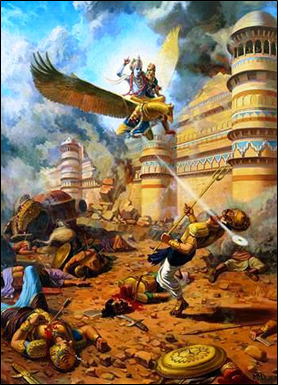
Nārada realizes the Divinity of Krishna
Sometime later, Sage Nārada decided to check as to how Krishna was doing after the battle with Narakāsura and marriage to 16,000 women. So, he reached Dwaraka, and was surprised to see thousands of palaces in that beautiful city.
He entered one palace and saw Krishna talking with one of the 16,000 wives. So, Nārada thought that perhaps Krishna spends a day with one wife, the next day with another and the third day with his third wife and so on. He then went to the next palace and was surprised to see Krishna again there. Krishna was playing with his children from the second wife. When Nārada went to the palace of the third queen, he found Krishna talking to the queen about making arrangements for a wedding. Nārada went to several other palaces but to his shock, he found Krishna in all of them, doing different things in each palace independent of the other forms. Each queen thought that Krishna was with her, but in reality, Krishna had multiplied himself 16,000 times and was able to take care of each queen lovingly and completely. Nārada realized that Krishna had infinite powers and could multiple Himself infinitely!
Earlier, when Krishna was a child in Vrindavana, he would multiply himself into identical forms during the Rāsaleelā dance and each Gopi thought that Krishna was dancing with her alone. In the same way, Bhagavān can take care of trillions of living beings and billions of galaxies all by Himself without exhausting his powers.
Krishna’s sister Subhadrā marries Arjuna
In Hastināpura, the elders convinced Duryodhana to divide his kingdom into two and give one half to the Pāṇdavas. Duryodhana agreed, but he gave the useless parts of his kingdom to his cousins, the Pāṇdavas. However, Krishna helped the Pāṇdavas to create a beautiful city called Indraprastha in that part of the kingdom. They started agriculture and trade in their kingdom on the advice of Krishna.
Very soon, their kingdom became as prosperous and happy as that of Duryodhana. Many famous scholars, rich traders, skillful artisans, and all sorts of brave, hardworking and intelligent people came from far and wide and settled in Indraprastha. It appeared as if Goddesses, Saraswati, and Lakshmi, themselves had started living in Indraprastha. Yudhishthira was a very good King, and he took great care of the people in his kingdom. Once the Pāṇdavas were well settled in Indraprastha, Krishna left them and returned to his own kingdom in Dwārakā.
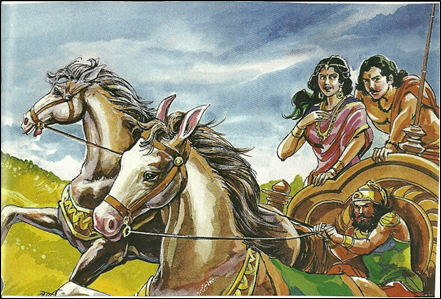
Meanwhile, Arjuna decided to go away to different pilgrimage places of India for 12 years. When he was in Krishna’s kingdom Dwārakā, he happened to meet Subhadrā, the beautiful sister of Krishna. The two immediately fell in love with each other. A Swayamvara had been announced for Subhadrā. Arjuna asked Krishna for permission to participate so that he could win her hand as his bride. But Krishna said, “No one really knows who will win her in the Swayamvara contest. My own brother Balarāma wants her to marry Duryodhana, who is his favorite student. Everyone is opposed to this because Duryodhana is an evil man. Subhadrā too does not want to marry him. She loves you instead. But we are helpless because Balarāma has already sent the wedding proposal to Hastināpura. Therefore, I want you to carry away Subhadrā and marry her.”
As per the plan, Subhadrā went to worship at the Shiva temple at the Raivataka Mountain close to Dwārakā. Suddenly, Arjuna appeared in a chariot and swooped up Subhadrā away from all the guards. When Balarāma heard of this incident, he was furious and wanted to kill Arjuna. But Krishna persuaded him and said, “Look, Arjuna is from the same noble family as Duryodhana. In fact, He is virtuous, whereas Duryodhana is given to evil ways. Moreover, Subhadrā and Arjuna love each other. Therefore, I think that we should celebrate their wedding and forget about marrying her to Duryodhana.”
Everyone there agreed to what Krishna had said, and Balarāma came around too. So, Arjuna was invited back to Dwārakā with Subhadrā and married with great pomp. Arjuna spent the remainder of the 12 years that he had decided to stay away from Indraprastha at a place called Pushkara (in the middle of the Thar Desert in North-Western India). Then, he returned to Indraprastha with his wife Subhadrā.
By helping his own sister elope with Arjuna, whom she loved, Krishna taught us that we should not force people to marry someone against his or her wishes.
Krishna helps the Pandavas kill Jarāsandha
Now, Rishi Nārada suggested to King Yudhishthira, the eldest Pāṇdava brother, that he should do a yajna called the ‘Rājasūya’ after which he would become emperor of the whole of India. This ceremony has been prescribed in the Vedas for a powerful King who wanted to become the Emperor. In this ceremony, Kings of all the other countries would have to bring gifts to the Emperor Yudhishthira and accept that he was greater than them.
But, if some King did not want Yudhishthira to be declared as the Emperor of the world, then a war would be declared against him. If Yudhishthira lost that war, he could no longer claim himself to be the Emperor of the world. And if Yudhishthira won, that other King had no choice but to accept Yudhishthira as his Emperor.
Yudhishthira was not very keen to perform the Rājasūya ceremony because he did not want any war to break out. But, Krishna said to him, “Yudhishthira, there are both kinds of Kings in this world, good and bad. It is important that a good person like you becomes an Emperor over them so that Dharma is obeyed by all human beings on this earth. I do not think that any other King will oppose your claim to be the Emperor.
The only problem could come from King Jarāsandha of the kingdom of Magadha. Jarāsandha has captured and imprisoned 86 Kings of different countries in Bhārata. He is a Bhakta of Shiva, and when he captures exactly 100 Kings, he will kill all of them as an offering to Shiva. These 86 Kings have no freedom to choose you as their Emperor. They will merely say what Jarāsandha asks them to do. It is your duty to release these Kings from imprisonment. By announcing that you are going to perform the Rājasūya, you will surely get into a fight with Jarāsandha. But, once you have killed him, you can free all these Kings and then complete your Rājasūya Yajna.”
Bheema and Arjuna agreed to what Krishna had said, and therefore, Yudhishthira too finally agreed. Disguised as Brahmanas, Arjuna, Bheema, and Krishna went to Magadha and scaled the walls of Jarāsandha’s palace. Krishna challenged him saying, “Either you release all the kings that you have imprisoned, or fight with one of us.”

When Jarāsandha saw them and learned who they really were, he said, “I refuse to fight with Krishna because he had earlier fled away from my army. Arjuna just looks like a young boy. Only Bheema is my match and I will wrestle with him till one of us dies.”
Jarāsandha installed his own son Sahadeva (not to be confused with the Pāṇdava brother who had the same name) as the King of Magadha, because he was not sure, if he will remain alive after the fight is over. A fourteen-day wrestling match occurred between Bheema and Jarāsandha, at the end of which Bheema killed the King by tearing his body into two halves.
All the captive Kings and many other prisoners were freed from the prison of Magadha and they thanked Bheema, Arjuna and Krishna for releasing them from Jarāsandha’s jail. Krishna showed them His form as the four-armed Vishnu and they all worshipped Him and pledged their allegiance to King Yudhishthira. Krishna requested them to come to the Rājasūya in Indraprastha.
Krishna met the new King Sahadeva and persuaded him to look at the Pāṇdavas as his friend and to accept Yudhishthira as the Emperor. Sahadeva agreed, but King Shishupāla of Chedi, an ally of Jarāsandha, became a sworn enemy of the Pāṇdavas.
Arjuna, Bheema, and Krishna then returned to Indraprastha, from where the various Pāṇdava brothers then set out in the four directions to announce that Yudhishthira wants to perform the Rājasūya ceremony and become the Emperor of the whole world. Krishna returned to Dwārakā.
A few Kings opposed, but they were all defeated. Finally, when all the four brothers returned to Indraprastha victoriously, the grand ceremony started. Kings from all over the world brought precious items as presents for Emperor Yudhishthira. Even the Kauravas, Bheeshma and other elders came from Hastināpura.
Krishna Washes Dirty Dishes
Invitations were sent to all the kings of India to attend the ceremony and they were asked to come with presents for Yudhishthira. Lord Krishna, who was the King of faraway Dwaraka in western India also came. Everyone wanted to help to organize the grand-function. Lord Krishna also requested that he too should be given some tasks to complete.
However, as He had come from a long distance and was the last one to arrive, the only duty that He could get was cleaning the kitchen after the feast was over. Everyone requested Lord Krishna not to worry about doing the cleaning job. They said that servants could take care of cleaning the kitchen. However, Lord Krishna insisted that He too wanted to help and would be pleased to do this cleaning job.
According to tradition, all the guests had to select a chief guest among them. This chief guest had to be someone very respectable and noble. He alone could put the crown of the Emperor of India on the head of king Yudhishthira. Everyone thought that Lord Krishna was the greatest of all those who were present in the function. Therefore, He was appointed as the chief guest for the entire ceremony.
The Rishis decided that the Yajna will be deemed successful if the Pāñchajanya conch shell belonging to Arjuna would sound on its own at the conclusion of the ceremonies.
When that did not happen, the Pandava brothers were disappointed. They started investigating the cause of why the Yajna was unsuccessful. They learned that a Shudra citizen of their kingdom had not attended the Yajna, and had stayed in his home because he was not invited respectfully.
Krishna addressed the Pandavas and said, “All human beings deserve to be treated with respect. No one should be insulted due to his social status.” Therefore, the Pandava brothers and Draupadi went personally to the Shudra’s home and invited him with great respect to attending the venue of the Yajna. As soon as the Shudra entered the Yajna venue, the conch shell started blaring loudly, indicating that the Yajna had concluded successfully.
After the program was over and Yudhishthira had been crowned as the Indian emperor, everyone decided to take some rest. However, Lord Krishna, the chief guest, was nowhere to be found. When people went out to look for him, they found Him in the main hall, where He was picking up dirty dishes and carrying them to the kitchen for cleaning.

Everyone was very moved to see how Lord Krishna kept His word. Even though Krishna was the chief guest and was the greatest of all, He performed His duty very humbly. Most people would have thought that picking dirty dishes and cleaning them was a lowly task, which only humble servants should perform. But our Bhagavān Krishna clearly thought the opposite!
By his actions, Bhagavān Krishna demonstrated that no task is lowly and that we should carry out whatever duty has been assigned to us diligently and with pride. Remember that work is worship. If Krishna could clean dishes after everyone had eaten, we too should follow his example and clean not just ours but also our family’s and friends’ dishes after they have finished their food.
This Series was first published on India Facts.
Disclaimer: The opinions expressed in this article belong to the author. Indic Today is neither responsible nor liable for the accuracy, completeness, suitability, or validity of any information in the article.

